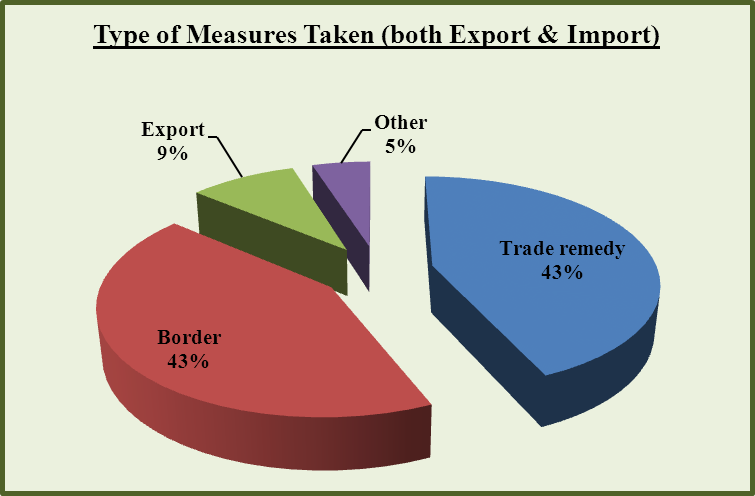Category: WTO Sub-category: World Trade Organisation
Document type: news
The World Trade Organization has warned its member countries against using protectionist measures such as limiting exports of food, agricultural commodities & raw materials and installing new barriers in the wake of the global financial crisis.
In its report that assesses the protectionist behavior of more than 180 nations between October 2010 and April 2011, the WTO pointed out the rising protectionist trend by its members which contradicts the promises made by the world's leading and industrialized economies to resist protectionism and its negative fallout. According to the report, over the past 6 months, the trade restrictions taken by WTO members and observer governments are more pronounced than in previous periods. The protectionist measures were also by the G20 countries which are in contradiction with the G20 standstill pledge.
During October 2010- April 2011, due to the lack of global rules on export breaks, at least 30 new restrictions were imposed compared to 25 similar measures imposed during October 2009-April 2010. These include export taxes and quotas. The reason behind the protectionist measures taken was a response to rising prices for agricultural products and export quotas on metals and mineral products with a view to securing domestic supply and addressing resource depletion.
For instance, China has imposed export limits on rare earth minerals, citing the environmental concerns and resource depletion. These minerals are key ingredients in high-tech goods, from fiber optics to mobile phones. China controls 97% of world supply.
The report warned that the use of protectionist measures to address these problems is hazardous.
It is expected that the finding of the report of WTO is going to stroke tensions in upcoming G20 meetings, Agriculture meeting on June 22-23, 2011and a Finance Ministers' meeting on Oct. 14-15, 2011.
According to the WTO rule, the export restrictions are allowed if they alleviate food shortages or environmental risks, although these restrictions can hurt net-food-importing countries and even cause serious food shortages.
Besides limiting exports, trading nations have increasingly resorted to unconventional import barriers such as lengthy customs procedures and food and health requirements.
The merchandise trade is expected to grow 6.5% in 2011. The volume of world merchandise trade has surged by 14.5% in 2010.
Other findings of the report:-
- Out of around 550 trade restrictive measures taken since October 2008, slightly more than 18% were removed or amended to limit their negative impact on trade flows.
- Around 45% of the total number of listed measures was trade facilitating.
- Besides the persistence of the effect of the financial crisis and global recession, the sovereign debt problems, rising prices for food and other primary commodities, and unrest in major oil exporting countries generate uncertainties for the near future.
- High unemployment in developed economies and sharp fiscal belt-tightening in Europe is likely to fuel protectionist pressures.
- During October 2010-April 2011, the number of potentially trade restrictive measures (including both import and export measures) taken by G20 economies were 122.

The imposition of trade remedy measures covers around 0.5% of total world imports and 0.6% of total G20 imports
- The sectors most heavily affected in terms of trade coverage of restrictive measures were machinery and mechanical appliances (refrigerators, freezers, and heat pumps), motor vehicles, meat and edible meat offal, electrical machinery, iron and steel, aircraft, ships and boats, plastic and articles thereof, and articles of iron and steel.
- During the period October 2010-April 2011, G20 members initiated 78 anti-dumping investigations compared with 83 initiations during the period October 2009-April 2010, a decline of 6%. Apart from Brazil and the Russian Federation, every other G20 member either initiated fewer anti-dumping investigations or no change in the period October 2010-April 2011 compared with the previous period. Australia dropped the anti-dumping investigations from 7 to 2, India from 20 to 15, Canada from 2 to 0 and China from 6 to 4.
- The anti-dumping investigations on products related to chemicals and paper products have increased.
- The total number of initiations of countervailing duty investigations by G20 members dropped from 11 during the period October 2009-April 2010 to 7 during the period October 2010-April 2011, while, the number of safeguard investigations by G20 members has remained stable.
- During the period October 2010 to April 2011, notifications of technical regulations and conformity assessment procedures to the Technical Barriers to Trade (TBT) Committee dropped slightly
External Links:
For full report, click here - WTO report on G20 trade measures
World Trade Organization - Official Website
Protectionism is the economic policyof restraining trade between states through methods such as tariffs on imported goods, restrictive quotas, and a variety of other government regulations designed to discourage importsand prevent foreign take-over of domestic markets and companies.
-









